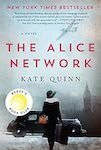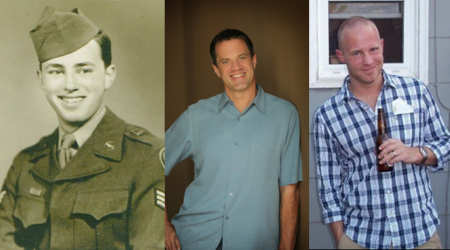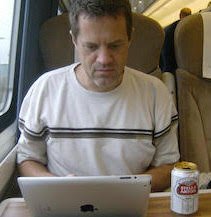Dom Testa's Blog
April 11, 2024
Fifty Years on the Run
Half a century. When you frame it that way, fifty years somehow takes on more significance. More respect. More gravitas, as the snooty magazines would say.

Fifty years ago this week, Paul McCartney’s “Band on the Run” was released as a single from his new group, Wings. After mostly limping by with minor success following the breakup of the Beatles, this was the song and album that exploded, finally delivering on the massive weight of expectations from a curious fan base.
Sure, he’d scored some solo hits—he even had two songs hit number one in America prior to BOTR—but you almost get the feeling those were purchases born of nostalgia for Beatlemania. “My Love” was Paul’s beautiful paean to his wife and bandmate, Linda, harkening back to his most precious love songs with the Fab Four, and “Uncle Albert/Admiral Halsey” was just weird enough to be a novelty hit.
Ah, but when the biting electric guitar intro of “Band on the Run” tore out of AM radios across the country, there was a collective sigh of relief. The rocker had resurfaced. He could still deliver. He still had it.
And while a few of his 1970s hits still pop up from time to time, BOTR is the real survivor of that era.
We’re lucky the album and songs we know today were recorded at all. McCartney insisted on laying down the tracks in the most exotic spot he could find. He chose Nigeria. Not exactly a Mecca (Macca?) for rock stars at the time. Or now, for that matter.
On the edge of a knife
Upon arriving in the African country, Paul and Linda were robbed at knifepoint. All of his demo tapes were stolen before he’d had a chance to properly record them, along with his notebook containing all the handwritten lyrics.
As he said later in an interview with England’s NME: “I had to remember the songs. Luckily I did.”
That wasn’t the only frightening thing to befall the pop star. The studios didn’t exactly measure up to the quality you’d expect for the world’s biggest pop star. The equipment was questionable and the location sported only a single tape machine.
And, like a nasty cherry on top of this shit sundae: Just before leaving England for Nigeria, two of his bandmates quit. That left just Paul, Linda, and guitarist Denny Laine to handle all the duties.
But then, this is Paul McCartney we’re talking about. The guy who can play guitar, bass, keyboards, drums, and any other odd instrument when needed. The dude could probably lay down a catchy tune with spoons and a jug.
All of this makes it even more remarkable that the result was a masterpiece. Fifty years later, it’s still McCartney’s most popular and biggest-selling album. Even the cover is iconic, featuring Paul, Linda, and Denny amongst an odd assortment of celebrities and pseudo-celebrities, posing as criminals breaking out of prison.
Is it too obviously a metaphor of McCartney finally escaping Beatles jail? Whatever. It’s just peculiar enough to be cool.
Movements
As for the title track, it likely remains relevant and timeless because of its unique arrangement. It’s staged in three separate movements, reminiscent of a classical composition—and, for that matter, recalling the unusual juxtaposition of McCartney’s song-within-a-song you hear during John Lennon’s “A Day in the Life.” Paul obviously enjoyed this medley approach, trying it again two years later with “You Never Give Me Your Money” on the Abbey Road album.
Most of the second side of that album, in fact, is one big medley of various songs, allegedly Paul’s baby.
He also used the stacking of different movements within the aforementioned weird track, “Uncle Albert/Admiral Halsey.” But it was “Band on the Run” where it really worked.
As for what the song’s lyrics even mean, well . . . who knows? I’m not sure Paul does. He’s given multiple answers through the years. The only common thread seems to be about escaping, breaking free.
For one line in particular—“If we ever get out of here . . .”—he cited a comment made by George Harrison during one of the many contentious meetings the Beatles had during their final year together. I think they all wanted to get out by that point. Paul took it to heart and, five years later, made it one of the anchors of his biggest hit.
So the song, which was released as a single in early April, 1974, nearly wasn’t made.
It was partly born from a painful experience with the bandmates he’d essentially grown up with.
It represented the height of McCartney’s artistic work as a solo artist. (Well, yeah, he was in a band, but come on: Paul WAS Wings.)
And now the song is eligible for its own AARP card.
Happy anniversary to one of the most fascinating rock songs of all time. If you’ve never heard it—or it’s been a long time since you have—perhaps download “Band on the Run” and spend five minutes in the majesty of it all.
* * *

If this post brought back fun memories, consider buying Dom a tea or a beer right here. He’ll toast you and Sir Paul. 🙂
December 19, 2023
The 2023 Reading List

I read an interview with an actor who mentioned that he kept track of every book he’d read for something like 30 years.
Sounded like a good idea to me. So, in 2013, I began keeping a list each year. Now, a decade later, I’m so glad I started this habit.
For 2023, it’s going to turn out to be 35 books. I’m on #35 right now, and should likely wrap it up between Christmas and New Year’s Eve.
As usual, I can’t stick with one genre. I know some people who do that, but I’m all over the place. In the past twelve months I’ve read:
Mysteries and thrillers
Historical fiction
True crime
Memoirs
Biographies
Science fiction
History

And I guess “Gone With the Wind” would fall into the historical romance category. It certainly fell into the LONG category. Ha!
Some of the titles are relatively new and one just came out this fall. But several are much older, dating back to the early part of the 20th century.
I’ll list them in the order in which I read them. You’ll see I went through spurts where I had to read several Agatha Christie novels (I love her) and in 2023 I finally discovered Anthony Horowitz. I promptly devoured seven of his books. If you can’t tell, I like his writing style.
If I have to pick a favorite for the year, I’ll go with “Magpie Murders,” from the aforementioned Horowitz. I loved the mystery-within-a-mystery format, and the writing is so smooth.
A close second might be—and this may strike you as weird—“The Rise and Fall of the Third Reich.” It’s a massive (nearly 1,300 pages) history of the absolute insanity that overtook Germany with the rise of Adolf Hitler, and how there were so many times when he could’ve been defeated—but wasn’t. I learned so much, although I’ll warn you: Because these things really happened, it’s depressing at times as you see just how brutally inhuman people can be to other human beings. I physically shuddered more than once. This book, while riveting, is not for everyone.
And in third place, I’ll give the nod to “Harbour Street,” by Ann Cleeves. I’ve become a fan of the British television series (called “Vera”) based on the Vera Stanhope novels, so it was fun to read one of the original tales. This one will likely end up as a selection in Dom’s Book Club.
So, if you wanna check out the complete list, here it is, along with a note here and there, in case there’s anything special I want to tell you. Plus, each comes with a link in case you wanna try them. Yes, these are affiliate links, which means I get a few pennies if you purchase them—but it costs you nothing more. The pennies just help pay for this website. And I obviously believe in the titles I’m sharing.
Hope you enjoy!

Nelson DeMille, “Plum Island”
Agatha Christie, “Five Little Pigs”
Agatha Christie, “The Mystery of the Blue Train”
Agatha Christie, “Lord Edgeware Dies”
Cixin Liu, “The Three-Body Problem”
This is translated from the original Chinese, and it’s a powerful science fiction story, the first in a series. I’m sure I’ll get to the others.
Maj Sjöwall/Per Wahlöö, “Roseanna”
The first book in the Martin Beck police procedurals series, written by the award-winning Swedish team and first published in 1965. It holds up well. I’ll probably read more in the Beck series.
Anthony Horowitz, “Magpie Murders”
Anthony Horowitz, “Moonflower Murders”
J.F. Penn, “Pilgrimage”
Joanna Penn and I have so much in common. She, too, is an introvert, she’s a writer, and she loves loves loves to walk. She’s like a female version of me. This is her memoir covering three classic treks, including the world famous Camino de Santiago in Spain. Superbly written.

Dorothy Sayers, “The Nine Tailors”
Edward Rutherford, “Sarum”
Dorothy Sayers, “Whose Body”
Dorothy Sayers, “Clouds of Witness”
Sayers is considered one of the pioneers of the detective novel, and came to be known as one of the “Queens of Crime,” along with Agatha Christie.
Kate Quinn, “The Alice Network”

A smash hit in 2017, this historical fiction is based on a real-life spy ring that operated during World War I. The story bounces back and forth between 1915 and 1947, but ties together beautifully.
Charles Murray/Catherine Bly Cox, “Apollo: The Race to the Moon”
Truman Capote, “In Cold Blood”
Sometimes credited as the first true crime book. It’s eerie.

Cheryl Strayed, “Wild”
Another memoir that involved walking . . . and walking . . . and walking. Great for the soul.
Dan Brown, “Angels & Demons”
John Higgs, “Love and Let Die”
An unusual comparison of two iconic artistic giants from 1960s England: The Beatles and the James Bond film series.
Agatha Christie, “The Hollow”
Tom O’Neil, “Chaos: Charles Manson, the CIA, and the History of the Sixties”
Agatha Christie, “Death Comes as the End”
Anthony Horowitz, “The Word is Murder”
Walter Isaacson, “Elon Musk”
Anthony Horowitz, “The Sentence is Death”
Anthony Horowitz, “A Line to Kill”
Anthony Horowitz, “The Twist of a Knife”
William L. Shirer, “The Rise and Fall of the Third Reich”
Anthony Horowitz, “Trigger Mortis”
Horowitz was hired by the Ian Fleming estate to write a James Bond novel that was true to the original 1950s novels. He pulled it off quite well.
John le Carré, “A Murder of Quality”
Matt Singer, “Opposable Thumbs: How Siskel and Ebert Changed Movies Forever”
I never realized just how much Siskel and Ebert blazed the trail for film critics.

Tess Gerritsen, “The Spy Coast”
Margaret Mitchell, “Gone With the Wind”
Yes, it’s 1,000 pages long, but Mitchell’s writing was terrific. I did the audiobook with this. Mad respect to Linda Stephens; her narration was incredible.
Ann Cleeves, “Harbour Street”

*currently reading* Terry Hayes, “I Am Pilgrim”—and loving it so far (100 pages in).
Happy reading! I hope your 2024 is filled with good books and great stories.
September 2, 2023
Timeless

Photo credit: s_bukley
Perhaps because it’s been around for nearly 70 years, rock music—in all its various incarnations—is at a point where we will now be losing heroes on a regular basis. Sad, but true.
The latest is Jimmy Buffett.
I write this as more an observer of the man and the artist, not as a diehard fan. I can appreciate how someone crafted a true brand, one that spoke to millions of people while transcending the pop charts.
And that’s the thing: In a 50-year career in music, Jimmy Buffett had one song break into the Top 20 of the pop charts. One.
To put that into perspective, Rihanna has had 31 songs reach the Top 20.
And yet, at his death, Jimmy Buffet had a net worth that Forbes estimated at around $1 billion. I don’t think that’s a reflection of Buffett “selling out” or becoming part of some greedy culture—far from it, in fact.
I think it’s a reflection of how his spirit captured something in so many people that it couldn’t help but be financially lucrative.
The Brand
Even without hits, his concerts continued to sell out. Over the last few hours, people have proudly posted how many times they’ve seen him live. I’ve counted several people who’ve seen him more than three dozen times in their life.
That sort of adulation comes because the man knew he didn’t need to write traditional (meaning “formula”) pop hits to speak to an audience. He turned a laid-back, flip-flop lifestyle into a brand that celebrated relaxing. His brand evolved from music to clothing to restaurants to books to retirement centers. It embraced a carefree, sunset-loving way of life that spoke to millions, even those who otherwise were workaholics.
At a Jimmy Buffett concert, for those couple of hours, there were no jobs, no bosses, no responsibilities. We all knew we’d eventually go back to that world, but while Jimmy was on stage, that world didn’t even exist.
I saw him live one time in my long radio career. In the 1990s, I took about a dozen listeners to Las Vegas to see him perform at the MGM Grand. Even though I wasn’t a Parrothead, I had a damned good time. And, looking around, I marveled at the devotion he’d developed with the crowd.
Today’s stars use a variety of marketing and branding tactics to build their empires, with social media at the core. Not only was there no social media when Buffett formed his fan base, I don’t remember him ever popping up on MTV. He occasionally appeared on late-night TV, but, based on his discomfort, I guarantee you it was reluctantly.
In other words, Jimmy Buffet built his massive following with no hit songs, no videos, no social media, and no pandering to the media at all. He recorded his songs, he put on his live shows, and he had the fucking time of his life.
The Song
As I played my favorite song of his on Spotify this morning—no, it’s definitely NOT “Margaritaville”—I also realized that, through his brand, Jimmy Buffett created his own timelessness.
Radio stations are practically neurotic about not straying outside predestined formats and formulas, deathly afraid of “confusing” their listeners. But because Buffett’s music always seemed to live within a format of its own—was it Pop? Rock? Country? Easy Listening?—I kinda feel like any radio station could play any one of his songs and few people would care if it broke “a rule.”
Some people would tune out, perhaps, because it didn’t have a mechanical drum beat, finger snaps, and multi-layered vocals. But I think a hefty number of people would stop what they were doing and realize that this was more about true craft and true emotion than it was about packaging.
No offense intended toward today’s artificially created “stars,” but there’s something refreshing about how Jimmy Buffet built everything organically. And honestly.
I wasn’t a huge fan. But I still can listen to “Come Monday” and can appreciate just how masterfully the guy captured the soul of someone who desperately misses the person he loves. It’s a song about loneliness, about someone feeling absolutely sick that they must give in to the grind of corporate life—spending “four lonely days in a brown L.A. haze”—and yet also a song about the hopefulness that his love will still be there when he escapes.
“Come Monday” peaked at #30 on the pop charts.
Which, given the way the music industry represents everything the song fought against, seems apropos.
I think the song is timeless. I think his unique brand is timeless. And I think Jimmy Buffett’s gentle spirit will always be timeless.
July 19, 2023
Paying For It

The band Stereophonics released a song in 1999 called “I Wouldn’t Believe Your Radio,” which includes these lyrics:
You can have it all, if you like.
And you can pay for it the rest of your life.
The song popped up on shuffle this afternoon, and, although I’ve heard it many times (and love it), this time I really focused on those two lines.
I can’t say what the songwriter (Kelly Jones) was thinking when he penned the tune, but I know how I interpret it.
I look back (sometimes way back) at choices I’ve made in my life, and recognize that I’m still paying for some of them. Especially the decisions that hurt other people.
We don’t pay for everything with money, you know. Sometimes we pay with little chunks of our soul.
Regrets
No, my life isn’t miserable. I’m quite happy. But I’m also not racing down the road of life with no feelings of guilt and regret. I’ve got a few. You might, too.
It’s important to stress that these regrets don’t hobble me, and they don’t drive me into despair. But they’re real feelings, just the same. The choices behind them impacted me and other people, and I’d be lying if I pretended they didn’t sometimes make me stop and reflect.
No doubt you’ve seen self-help memes that claim, “You should never live a life of regrets!” Well, that’s utter bullshit. It’s important—perhaps even healthy—to embrace your regrets, not to pretend they never happened. Sweeping stuff under the rug is cowardly.
Because of that, I have certain regrets I have no intention of forgetting. If we’re fortunate, those regrets help us make better decisions later. We hope so, anyway. They’re called life lessons, after all.
Like the song says, I’ll continue paying for those choices for the rest of my life. They don’t bankrupt me. But they keep me grounded, they keep me human, and they keep me introspective.
Yes, I can have it all, if I like. And I’ll pay for it. The good and the bad. I mean, doesn’t “all” include both?
* * *

If this quick post resonated with you and you’d like to buy Dom a tea or a beer, that would be way cool. You can do it right here. And I promise, you won’t regret it.
June 30, 2023
Let’s talk about your “journey.”

Maybe this will sound mean-spirited, but I swear it’s not. I just can’t help but snicker every time I hear people describe their life as “a journey.”
I've written several books, but I'll never have a bestselling self-help book because I refuse to use that word.
Unless I’m referring to the band.
Yes, your life (and mine, and everyone's) is perplexing, turbulent, and often a vast mystery. But constantly calling it a journey sounds a bit pretentious, don’tcha think?
I suppose it bathes you in some kind of spiritual aura. But come on. You got up this morning, you put on clean underpants, sat in traffic, did your job, texted your friends, drove back home, ate a couple of tacos, walked the dog, then binged two more episodes of your favorite show.
Is that a journey? Or is it simply life? Some of you even quietly skipped the part about the underpants. Remember, a journey of a thousand miles begins with clean drawers.
The WHY?
The psychology of this is interesting to me. The big question is: Why do we have this need to elevate the mundane into something extraordinary? And I certainly don’t equate “mundane” with something bad. In fact, the definition I associate with the word is “characterized by the practical and ordinary.”
Hey, most of us live ordinary lives, as described above. It’s nothing to be ashamed of. Hell, in an overscheduled and overstimulated world, doesn’t mundane sound pretty damned good sometimes? How many of us would love to have a dot-free, uninteresting weekend every once in a while?
Perhaps it’s telling that the popularity of the word “journey” coincides with the explosion of social media and reality TV. I never remember anyone calling their life a journey prior to 2002.

That’s when the TV show “The Bachelor” first became popular. All those contestant began describing the process of surviving elimination on the show as “their journey.” It became a buzzword.
So by that definition, a journey is having sex with as many strangers as possible. I suppose that is a spiritual connection, of sorts.
Putting that aside, take a look at the social media aspect. Today, you can’t scroll for more than ten seconds without being subjected to photos of someone else’s fabulous life: vacations in Greece; children graduating from an Ivy League school; hiking the Canadian Rockies; hosting a dazzling dinner party catered by a five-star restaurant.
Let’s just be honest: For nearly 20 years, life has turned into a game of keeping up. Now we must paint our existence on a public canvas with glorious colors. We must define our life in exciting terms. To stay one step ahead of a comparison-based depression—and don’t think for a moment that’s not a real thing—we must make our lives sound much more interesting.
It’s all a game

The thing is, we all know we’re playing this game, just like we know the photos on a fast-food burger commercial have been staged to look a hundred times better than the real thing. We know the photos of a home for sale have been staged by a professional to make that fixer-upper look like a palace. It’s even an actual title: Home stager.
We each act as the stager of our life, dressing it up to impress. And we all know we’re all doing it.
Thus, by polishing it up, it’s no longer just a normal life. We will now describe it as a journey.
It’s funny, really. We embellish our lives to feel better about our daily routines and to fool everyone into believing we don’t even pass gas. Nobody is fooled, but we all agree to play along. I’ll pretend to buy your bullshit, you pretend to buy mine. And we all go merrily on our way.
But to bring all this home, what does it take for our lives to really qualify as some virtuous journey? To earn that description?
How about this simple suggestion:
Go out and do something exceptional today that completely alters your path or—even better—makes a substantial difference in another person's life. THEN we can discuss promoting your daily existence to a journey. You’ll be truly taking yourself from one place to another, metaphysically speaking. One of the components of metaphysics, after all, is purpose. Another could be described as something transformative.
Until you really transform your life or the lives of others through your deeds, I think you’re just living. Which is fine.
But you can certainly start a real journey today.
In the meantime, Don’t Stop Believing.
* *. *

Sometimes Dom would like his journey to take him straight to an ice cold beer, or even a mug of tea. If this essay resonated with you and you’d like to make his dream come true, you can buy him that tea or beer right here. That would be very nice.
June 17, 2023
The Middle Dom

My dad’s name was Dominic, even though he went by Donald throughout his military career. (There was a lot of prejudice against Italians back in his day.)
I’m Dominic, Jr. To honor my father, I named my son Dominic III.
That makes me the middle Dom. And I’m the luckiest of the three.
This Father’s Day weekend, I have a chance to reflect on how much better my life is because of my dad and my son.
My dad grew up in a tough neighborhood during tough times, which often leads to a wayward life. But instead of falling down that hole, he became a man of responsibility and discipline.
He married my mom, who was raising four kids on her own, which overnight made him a father. He brought order and love—albeit tough love, sometimes—to a somewhat-chaotic situation. And he brought a lot of laughter.
So my sister and I were fortunate. We were born later into a family that had grown together and persevered through some pretty tough times. I, on the other hand, had a great childhood.
From my dad, I learned work ethic, how to handle responsibility, and how to laugh my way through life. All three have helped me grow into the man I am.

Dom III
When I had my son I instantly had to tap into that responsibility. I was young and overwhelmed with fatherhood, but discovered that I loved it.
It helped that I was blessed with a loving, brilliant, and dynamic young man for a son. His sense of humor is an exact match of the two older Doms. Three peas in a pod.
From D3, I’ve learned to explore outside my comfort zone, a gift I don’t take for granted. He’s kept me young(er), he’s injected enthusiasm and insight into both my radio and writing careers, and by marrying the sweet, charming, and equally snarky Sabra, he brought an incredible daughter-in-law into my life.
I’m the Dom in the middle, the one who’s the luckiest guy ever, bracketed by two people I look up to and revere. On Father’s Day, I’ll be thinking about how much I’ve received from both sides: my dad and my son.
I’ll think about all the laughter that has gone along with all the lessons. I’ll be grateful.
And I’ll be happy.
June 14, 2023
The Career Venn Diagram

Think of all the pressure associated with one particular life choice: What do I want to do for a living?
You could spend four—or more—years pursuing a degree in order to start a career, only to discover you (a) hate it, (b) have no aptitude for it, and (c) are now tens of thousands of dollars in debt. Or more.
I talked about this with my son when he was finishing high school. I’ve spoken to high school students about it while hosting assemblies.
Now I have a college-age step-daughter whose wondering the same thing: What do I want to do?
And it’s not just 18-24 year olds puzzling over this. Plenty of people in their 30s, 40s, and even 50s stay awake at night, staring at the ceiling, considering a career change but terrified of the potential outcome.
I have no formal training in career management or guidance counseling, but I do have an awful lot of practical experience in two separate—but parallel—careers over several decades. And this is always my suggestion:
Give a lot of thought to going after a career that lies in the intersection of a Venn diagram with three circles. Those three circles represent three different criteria for a successful career path.
Circle Number One: Do you truly enjoy it?

Hey, roll your eyes if you must, but it’s not as obvious as you think. Millions of people drag out of bed every day to do something that kills their soul, hour by hour.
And it’s complicated, too, because our tastes change as we age and evolve. Yet I’m convinced every person has a core collection of things that bring them joy, in many forms.
Since I was a kid, I’ve enjoyed almost anything involving words. Back then, I read everything I could get my hands on, and I loved the writing projects we were assigned at school. I spent a couple of years listening intently to the disc jockeys on KRBC, an AM Top 40 station, and then KNUS-99, a powerhouse FM Top 40 that owned the Dallas airwaves.
My friends were listening only to the music, while I was listening to how these magical radio gods behind the microphones crafted their shows. It spoke to me in ways I didn’t fully understand, but it drove me to put aside my natural shyness and introversion and to apply at a small radio station. I was 16, scared to death, but sure that this was something I’d enjoy. I did. I have. For more than 45 years.
So finding something you enjoy could branch off into several directions. But what’s at the core of your passion? Is it helping others? Is it sitting alone in a private office, focusing on numbers? Is it the outdoors? There are multiple ways to tap into what inspires you, but the key is first finding the larger category before narrowing it down.
That first circle is just one of three.
Circle Number Two: Are you good at it?

This has the potential to be heartbreaking, I know, but I never said I’d blow sunshine up your skirt. I’m bringing a little tough love.
Look, we all have things we like to do but that, unfortunately, are not in our skills wheelhouse. And while plenty of people sell a shit-load of books telling you that you can do anything you want, I’m here with a fierce injection of reality.
You can’t. Sorry, you can do a LOT of things, probably way more than you even realize right now. But you cannot do ANYTHING you want.
Not a popular position, I get it, and the woo-woo crowd (and self-help authors) have already clicked out of this essay. It’s very enlightened (allegedly) to tell every person they have unlimited potential.
Nope. You have things you’re good at and some things you can at least improve on with time and training. And then there are things you just won’t ever be good at. Sorry, but it’s true. There are a ton of things I’d love to do, but I’m mature enough to realize I didn’t inherit that gene.
That’s okay. There are so many other things where I DO have skills. The other stuff? It can be a hobby, and there’s nothing wrong with that. It’s just not a career choice.
So we have two of the three circles: Things we love to do and things where we have some innate ability/talent. We’ve begun our Venn diagram. All we need to add now is the last component, another one that will cause grunts of displeasure and possibly even outrage, which is quite en vogue these days.
Circle Number Three: Can you make a good living at it?

Oh, Dom! How shallow of you! How despicable to assign a value to our passions! Creep!
Yeah, yeah. How’s the weather today in Utopia?
I live in a world where someone always wants to get paid for the things I want. A mortgage company would really like to get paid back for that home loan they gave me. The insurance company is expecting another premium payment to insure my car.
Oh, and the grocery store doesn’t take kindly to me walking out with a basket full of groceries without giving them my credit card.
Sorry, Peter Pan, but unless you’re a trust-fund baby—and I actually have friends who are—you’re gonna need to deposit money INTO your bank account, too. Which means you need to get paid.
Which means money is an inescapable component to this equation.
I know, it takes all the romance out of the subject, but it ain’t too sexy having your furniture repossessed, either.
Now we have all three circles, and for every single person there’s an intersection. It may not be what your high school counselor suggested, and it may go against those dumb Myers-Briggs results you once received.
But you can throw that old shit away. Instead, it’s about sitting down somewhere quiet with a notebook and a pen, and figuring out all of the things that go into the first two circles. Be honest with yourself, don’t fudge.
Because if you lie about how much you enjoy something, you’ll be miserable again in a year or two. And if you b.s. yourself about your talents, you’ll simply fail.
Examine your natural talents or the ones you’ve enhanced to the point where you’re beyond competent and have stretched into the “good” category. Combine those with the areas that bring you joy. What are they? WHY are they is probably a good talk to have with yourself, too.
Then find the careers that embrace those two circles and pay well enough to satisfy your life demands plus a touch more. The three-circle Venn diagram could really open your eyes.
For me, a career with words seemed natural, so I became a morning radio host and a writer. I love both of my careers. I mean, I really love them. I’m happy when I’m on the air, and I’m happy when I write THE END to a new novel. Lots of joy there.
Am I the greatest of all time at either? Nope. But I’m good enough to stay employed (more than 45 years on the radio as I write this) and to have published 25 books—with at least two more coming before the end of 2023. I don’t have to be the best; I just have to be good.
And do those careers pay well? They certainly don’t for some people, that’s true. But the point is they CAN. A successful morning show host can make a good salary, and a hit book series can pay off, too. I’ve found the intersection of all three circles.
Just give it a chance
Is my system perfect? Please, we’re not children; we know life is full of imperfections and sometimes bad things just happen. Radio stations can change formats and good people are canned. Books can get a wave of bad reviews and the author is set back.
But we’re talking about giving yourself, or your kids, a better-than-fighting chance to succeed and find happiness. All of it will take hard work—which could be the fourth circle, except the words “work hard” tend to scare off some people before they even give a career a chance.
I think it’s as good a starting point as anything I’ve read or heard. It takes an honest assessment of yourself and it takes some research into what various careers can pay. Then you work your butt off and give yourself the best possible chance.
Hope this helps at least one or two people. Send me a note if it does. I’m cheering you on.
* * *

If you’ve found the creamy middle of your own career Venn diagram, power to you. If that moves you to buy Dom a tea or a beer, cheers! You can do that right here. And thank you!
May 25, 2023
A Toast to Indies

Sometimes it takes years to finally get the last laugh. But somehow that makes it almost sweeter, knowing that you patiently waited for someone—or, in this case, an entire industry—to catch on to something you knew all along. I’m sure you’ve experienced it at least once in your own world.
For me, it’s not so much a laugh as just a satisfied smirk.
Nearly 20 years ago, I published my first book. It was the start of an action/adventure series for middle school and high school readers, although ultimately the series was enjoyed by plenty of adults, too.
But I published the first three books in that series independently. That means I not only wrote them, but I laid out the interiors, hired a cover designer, arranged for printing and distribution—pretty much slaved over every single aspect, including sales and marketing.
A few people were doing this in 2004, but not many. Why? Well, for one thing, because it was damned hard. There was nothing like the technology we use today. There were no apps or software programs designed exclusively for book publishing. You had to learn all sorts of programs yourself and manage the entire business side, too. It could be hell. Let’s just say you really had to be committed.
But that’s not the only reason there were so few of us. The harsh truth is that, at the time,“self-published” authors were scorned by the rest of the industry. And I’m not exaggerating. If you weren’t published by one of the big players in New York or London, you were considered a worthless hack.
I didn’t care. I worked hard on the books, which not only sold reasonably well, but also won multiple awards. I put up with the sneers of the publishing elite. Sometimes they were downright rude.
I’ll never forget the message I got from the book editor of a major daily newspaper. She practically laughed me off the phone when I asked if she’d please review my book that had just won the International Grand Prize from Writer’s Digest magazine. I mean, that had to be worth something.
“Oh, no, we don’t review self-published books.” And her emphasis on the term made it sound like the books came in a plastic sack filled with vomit. She dismissed me like I was an affront to the industry, and shoo’d me off the phone.
In 2007, my books were picked up by Tor/Forge, a major publisher in New York. They signed me to a six-book contract, which I guess gave me some sort of legitimacy after a few years as an indie. But when I spoke at conferences, all of the other authors on the panels still treated me differently when they found out I began on the indie side. I was the poor creature who’d been allowed to sit at the adults’ table but would never be welcomed into their inner circle.
It was both perplexing and aggravating. I enjoyed my deal with Tor, but I also kept independently publishing other books.

Well, a funny thing happened. By around 2013, the indie world began picking up steam. Several indie authors burst onto the scene and sold more than a million copies of their work. The international publishing world began to grow very uncomfortable. How could this be happening? Didn’t people know that indie writers were peddling crap?
Around the same time, that book editor at the newspaper was out of work. The world had changed and newspapers were either slashing their workforce or closing altogether. And—no lie—the last time I encountered her, she was asked to speak with me on a panel about . . . independent publishing.
I gotta be honest; I got a tiny bit of satisfaction out of that panel.
Now, in the last couple of weeks, a major superstar in the publishing world made headlines for launching a Kickstarter campaign that raised millions of dollars so he could—wait for it—INDEPENDENTLY PUBLISH a series of books.
This same superstar sat beside me at a couple of panels back in 2009 when the world grimaced at poor slobs like me who sullied the publishing world by doing things independently. Today, the movement has cachet and everybody who mocked indie writers in the early days of the century suddenly has developed amnesia about their ‘tudes back then.
It’s been 19 years since I began on my indie path. Since then I’ve published six books with the biggies in New York and I’ve published another 19 independently. I’ve walked in both worlds, but feel like I have the same independent spirit today that prompted me to roll up my sleeves and tackle all the work in the early 2000s.
Indie writers who jump in today have no idea what we went through, and I’m not just talking about the challenges with tech. Sure, today you can pop out a few thousand words on a laptop or your phone and have it on sale at major online retailers within a day. Incredible.
The technology, however, isn’t the only thing that has changed. Now everyone who shunned indie writing and publishing is suddenly embracing it, and—in a somewhat disgusting twist—is acting like they’ve always admired indies.
They didn’t. They barely spoke to us, and they wrote volumes on how wretched we were.
So allow me to say cheers to all my fellow independent writers and publishers who’ve been around for at least the last 15 years. You, too, have paid your dues and, finally, get the last laugh. Yes, now we can sit at the adults’ table.
Oh, wait, I’ve got that backwards. They’re sitting at OUR table.

If you want to support the independent spirit, buying an indie author a tea or beer is a delightful way to do it. You can buy one for Dom right here. And cheers to you.
May 13, 2023
No Tips

I receive many questions from people who want to write and publish. They often start with the same six words: "Can you give me some tips . . ."
So here I thought I'd share my email response to a young man who started by asking for general "tips." When I wrote back and said, "Dude, you just need to read every day," he doubled down.
He wrote back and asked for specific tips on "being descriptive." I'm sharing my response for anyone who has these same questions. You may think I'm full of it, and that's fine. But my words are heartfelt.
Hey Kaiden,
I’m about to throw down some tough love you will not want to hear. Prepare yourself.
I appreciate the fact that you’re anxious to increase your knowledge about writing. I think that’s cool, and I encourage it.
But what I wrote back to you last time is going to be my answer for ANY specific question you have. Tips on being descriptive? The only tip I have is to constantly read and study how different authors do it.
Tips on dialogue? Read a bunch of novels and see how various authors do it. Some of them, like Elmore Leonard, are (in my opinion) masters of dialogue.
Tips on pacing? Tips on first paragraphs? Tips on setting?
Dude, there just are no shortcuts for learning these things. There are no “tips.” Take 100 writers and they’ll have 100 different ways of being “descriptive.” Then 100 other writers will have 100 different ways of creating tone, mood, and writing dialogue.
I don’t believe in tips. Tips are like looking for a YouTube shortcut, like learning how to install a furnace filter. With writing, there are no shortcuts. The only way you learn is to read and to write. Every single day.
You won’t copy anyone else. That’s not what I’m saying. But you’ll gradually develop your own style based on the variety of other writing styles you’ve absorbed.
The stuff you write today will suck compared to what you write a year from now. And a year after that your writing will be much better again. I never read a “how to” book on writing. My how-to books were just other books.
Are there books on the craft of writing? Sure. And many of them could be sorta helpful. One of the few I’d recommend is by the guy I mentioned above. “Elmore Leonard’s 10 Rules of Writing” is one of the best ever, and he obviously feels the same way about tips that I do.
But if you’re curious about being descriptive, there’s no tip—just pick up a really good book, a classic like “To Kill a Mockingbird” and see how Harper Lee described the town of Maycomb. You'll feel like you're really there.
I guarantee you any other author would’ve described it in a completely different way. So what tip would Harper give compared to these other writers?
We don’t learn writing by getting tips, nor by seeing how ONE person does it. We each have our own style, and we get inspired by reading the hard work that another author has invested into a book or short story. We slowly—and that’s the key—we slowly grasp the nuances of writing and telling a story.
I know you want tips and shortcuts, but I don’t want to give you shortcuts. I was reading like a madman when I was your age. I probably went through two or three books a week, every week. And to this day, even though I’m busy writing every day, I find time to read 30-35 books a year.
These days I’m writing thrillers. So currently I’m reading a classic series of thrillers by an author named John D. MacDonald. His style is VERY different from mine, but I like seeing how he pulls it off. It’s refreshing and interesting. And ultimately it will make me think about trying new things.
You’re probably frustrated that I won’t just give you tips. I don’t believe in them. Writers write. Go back and look at what I said in my last reply to you: “Lots of people TALK about writing, but only a few really put in the work . . .”
I know this is not what you want to hear. You may want the YouTube version of learning how to write. But Kaiden, in my opinion it doesn’t exist. Your questions are excellent, they really are, but the answers aren’t in a textbook. They’re in the books you’re already reading. Or hopefully reading.
So instead of reading for fun, start reading with the eye of a writer. Pay attention to how authors craft their stories, how they build suspense, how their characters converse. You need to read like a student of writing.
Sorry if I’ve disappointed you, but I wish you all the best in the world. Keep reading and keep writing. I think you’ll find over the years that your best teachers are simply other authors.
Dom
To follow up, I can tell you this: I never heard a peep back from Kaiden. That pretty much told me I was spot-on with my analysis: He merely wanted the shortcut. Actually putting in the effort was out of the question. “Just give me the bullet points, man.”
Lots of people who are selling “How To Write” books will gladly proclaim they can tell you these quick answers. Just give them $19.95 and they’ll reveal the mysteries of writing to you.
But, sorry: There are no “tips,” other than to read and write every day. There, I just saved you 20 bucks.
* * *

If you hated this advice, do NOT buy Dom a tea or a beer. But, if deep down you think he’s probably right, throw him a beverage right here. You’ll still come out ahead.
May 9, 2023
Warm Reception

Two weeks after my 16th birthday, I walked into a radio station’s lobby to ask about a job. I was a shy kid and had no idea what I was doing.
A woman named Renee sat behind the receptionist’s desk. She could not have been nicer to me. Barely containing a smile, she asked what I’d done to procure a job as a disc jockey. I explained (probably trembling) that I didn’t know how to do anything.
Renee pulled out a sheet of paper and began writing down instructions for me: This is how you make an audition tape; this is what you should have on there; when you’re finished, this is the person you want to contact; here’s his phone number; here’s the best days to reach him.
She ended with, “Any questions, just call me.”
* * *
Today (May 10) is National Receptionists Day. Over 40 years later, I remember the name of the woman who held down that position at KFMN, and who essentially coached me. That certainly wasn’t part of her job description, and yet without her, there’s a good chance I would’ve ended up working at a grocery store or a landscaping company.
I’ll never understand why so many companies treat their receptionist as a throwaway position. I once penned a business article titled “Front Line Troops,” and it was a warning that too many businesses don’t understand the importance and value of their receptionist.
She or he is the first person your customers/clients will see and talk to. We all know the importance of the first impression. If they’re well trained and well paid, they can be a remarkable asset. And yet far too many short-sighted companies will never understand that.
In fact, plenty of companies have eliminated the position entirely—they either have various other employees rotate the responsibilities, or they simply don’t have a human being there to greet people.
Companies see this as a cost-cutting measure. I see it as another example of short-sighted thinking. What price do you put on customer relations and customer satisfaction?
If I ran a radio station, I’d hire a real fireball to represent the entire staff. It would be someone who greeted every person who walked through the door with a huge smile, made them feel important, and made them feel like that trip into the radio station was the best appointment they’d have all week.
I’d teach them everything about the station so they would never be at a loss to explain anything. They would have decision-making responsibilities. They’d get shit done. People skills would be crucial and impatience not tolerated.
But when I found the right person, I’d pay them a big salary and then bonus them when the station succeeded. I’d go so far as to make them a known entity to the listeners, calling and putting her/him on the air for bits during the morning show. Make them a star. Make them part of the family.
Not the disrespected and often-forgotten person who sits quietly at the front desk of many companies.
On National Receptionist Day, I nominate them as some of the most misunderstood and most under-utilized assets around the country.
Thank you, Renee, for helping me start my career.
And thank you to every receptionist who cares about what they do. You’re appreciated.
* * *

Generally at the end of these posts you’ll see a suggestion to buy Dom a tea or a beer. This time, buy your company’s receptionist a case of wine or a month of coffee.



